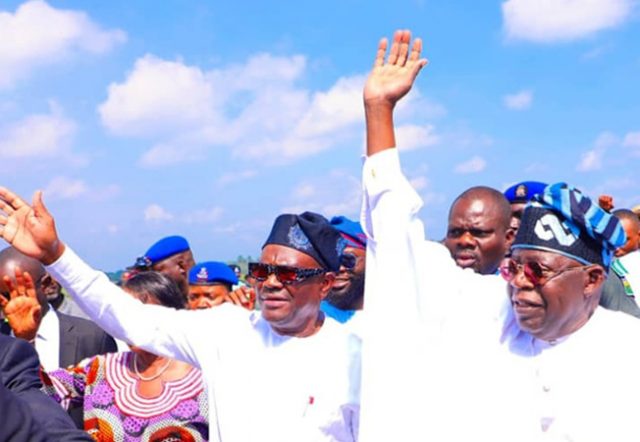Wike’s Endorsement of Tinubu for 2027 Sparks Intense Backlash from Opposition…Former Rivers State Governor and current Minister of the Federal Capital Territory, Nyesom Wike, has once again stirred political controversy with his public endorsement of President Bola Tinubu for the 2027 presidential election.
This declaration has unleashed a wave of criticism and condemnation from opposition parties, who accuse Wike of betraying his former party, the People’s Democratic Party (PDP), and undermining the opposition’s efforts to challenge the ruling All Progressives Congress (APC).
Wike’s endorsement of Tinubu is a continuation of a pattern that first became clear during the 2023 general elections.
Despite being a leading figure in the PDP, Wike openly opposed his party’s presidential candidate, Atiku Abubakar, and instead lent his support to Tinubu’s campaign.
This unexpected move played a significant role in consolidating Tinubu’s victory.
Following the election, Tinubu appointed Wike as the Minister of the Federal Capital Territory, a move widely interpreted as a reward for his defection.
Now, Wike’s vow to lead Tinubu’s 2027 re-election campaign has only deepened divisions within the PDP and further inflamed political tensions nationwide.
Opposition members and PDP loyalists have reacted swiftly and sharply to Wike’s endorsement.
Dare Glintstone Akinniyi, a prominent PDP chieftain, described Wike’s actions as “embarrassing” and accused him of undermining the party’s unity at a critical juncture.
READ MORE: Tinubu Moves to Settle N2tn Power Sector Debt, Restore Electricity Supply Confidence
Akinniyi called on the PDP leadership to take firm action against Wike and other members of the so-called “G-5” faction within the party, who are seen as having weakened the PDP’s political standing through their dissent.
He also warned that younger members of the party are becoming increasingly frustrated and ready to mobilize if corrective measures are not taken promptly.
The criticism extends beyond just internal PDP voices. Timi Frank, a former Deputy National Publicity Secretary of the APC, has accused Wike of abusing his ministerial position to target opposition figures by revoking their land holdings in Abuja.
Frank alleged that these actions are part of a broader strategy to intimidate and silence potential challengers ahead of the 2027 election, effectively using governmental powers to suppress political dissent.
These allegations have added further fuel to the already volatile political atmosphere and raised concerns about the misuse of authority in the lead-up to the next general election.
Despite the fierce opposition, Wike remains resolute in his support for Tinubu.
He has defended his stance as a matter of political pragmatism and a belief in the need for continuity and stability in governance.
According to Wike, the nation requires a steady hand to guide it through economic challenges and security concerns, and he believes Tinubu is best positioned to provide that leadership.
His unwavering loyalty to the president has positioned him as one of the most vocal advocates for the ruling party, even as it alienates him from many former allies.
This endorsement has intensified the already complex and fragmented political landscape in Nigeria as the 2027 elections approach.
The PDP faces internal struggles to contain dissent and maintain cohesion, while the APC seeks to capitalize on defections like Wike’s to strengthen its hold on power.
Political analysts predict that the coming months will be critical in determining how these dynamics play out and whether Wike’s support will translate into tangible advantages for Tinubu’s campaign.
As the drama unfolds, the PDP’s response will be closely watched by political observers and the general public alike.
How the party manages internal divisions and addresses Wike’s growing influence could either make or break its chances in the next presidential contest.
Meanwhile, Wike’s endorsement has opened a new chapter in Nigerian politics, underscoring the challenges of party loyalty and the fluid nature of alliances in the country’s democratic process.
With tensions running high and the stakes growing ever larger, Nigeria’s political future remains uncertain.
The endorsement by Wike may prove to be a pivotal moment, reshaping alliances and setting the tone for the battles to come in the run-up to 2027.




